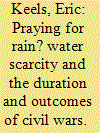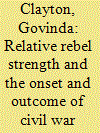| Srl | Item |
| 1 |
ID:
164517


|
|
|
|
|
| Summary/Abstract |
Recent anecdotal evidence from the civil wars in Somalia and Yemen suggest that water scarcity may shape the dynamics of civil wars. While a considerable body of research has examined the connection between water scarcity (such as low rainfall) and the onset of civil war, very little research has examined how water scarcity may shape the duration and outcomes of civil wars. Looking specifically at rainfall, this paper argues that changes in access to water play a key role in the duration of civil wars. As rainfall declines, there is a reduction in resources available to both the government and the rebel group, leading to a stalemate in fighting. Furthermore, this paper argues that declines in rainfall are felt more acutely by rebel groups who seek to challenge the government through conventional warfare. This paper tests these propositions using hazard models. The results provide robust support for the propositions.
|
|
|
|
|
|
|
|
|
|
|
|
|
|
|
|
| 2 |
ID:
124111


|
|
|
|
|
| Publication |
2013.
|
| Summary/Abstract |
To what extent does the relative strength of a rebel movement impact upon the likelihood of a peace settlement in civil conflict? This article argues that relatively stronger rebels are more likely to overcome the strategic bargaining problems that can prevent the resolution of war. Relatively strong insurgents are better equipped to significantly challenge core government interests and fundamentally threaten the survival of a regime. The incumbent's fear of future violence therefore makes mediation more likely to be undertaken in high-stakes conflicts between states and strong rebel groups. Relatively strong insurgencies are also those with the greatest leverage to negotiate enforcement mechanisms and the best equipped to defend themselves in the event that the government reneges on an agreement. This reduces the scale of the commitment problem and increases the probability of relatively strong rebel groups agreeing to a settlement with an incumbent. This argument is tested using dyadic data that capture the relative position of insurgents in civil war from 1946 to 2004. This represents an important methodological shift within the mediation literature, which has in the past largely relied upon aggregate country-level data. The results suggest that relatively stronger insurgents are more likely to force the state to open a mediation process and eventually concede some form of settlement. This is further evidence of the need to capture the dyadic relations between actors with fine-grained disaggregated data.
|
|
|
|
|
|
|
|
|
|
|
|
|
|
|
|
| 3 |
ID:
186870


|
|
|
|
|
| Summary/Abstract |
In the course of civil war, it is not unusual for armed rebels, who are fighting to either take control of a state or create a new one, to create state-like governing institutions. For example, nearly 64% of rebels between 1945 and 2012 created at least one governing institution. One challenge to moving the literature on rebel governance forward is getting data on the many possible institutions that comprise rebel governance. I introduce new data, the Rebel Quasi-State Institutions dataset, which covers 235 rebel groups and codes annually for 25 institutions during the entire existence of the group. I demonstrate the usefulness of this new dataset by exploring a relationship important to scholars: that of rebel strength and rebel governance institutions (Stewart, 2020). These analyses show two things. First, there is value in disaggregating rebel governance and looking at institutions separately because not all governance institutions are correlated with strength in the same direction. Second, taking into account the time dimension is important. Since rebel conventional capability increased as a result of the end of the Cold War (Kalyvas & Balcells, 2010) and rebel institutions became more prevalent, there is an important time component to rebel governance that correlates with events in the international system.
|
|
|
|
|
|
|
|
|
|
|
|
|
|
|
|